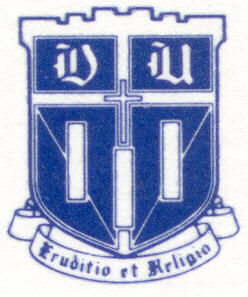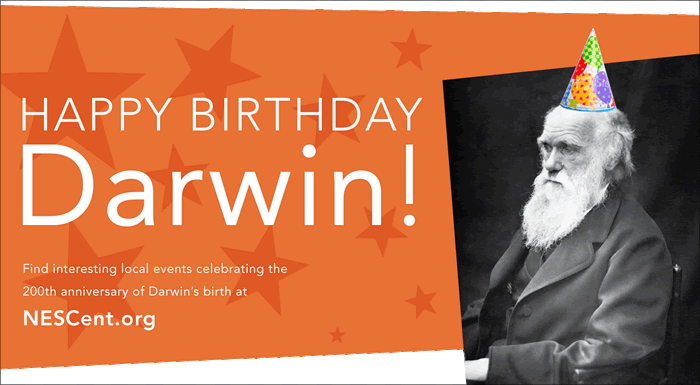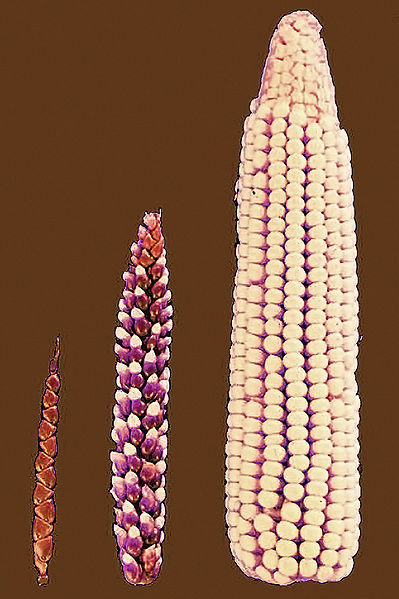Celebrating Darwin's Birthday
Charles Darwin was born February 12, 1809 and every year NESCent and other groups celebrate his birthday with a variety of public events. Why is Darwin’s birthday worth celebrating? Because Darwin’s insight and the phenomenal amount of supporting evidence he compiled in The Origin of Species formally introduced the theory of evolution to the world, and because the theory of evolution forms the framework for understanding the biological world, that's an accomplishment worth celebrating. Darwin's birthday provides an annual opportunity to share both the history and the most recent developments in evolutionary biology. 2009 was the 200th anniversary of the birth of Charles Darwin and was also the 150th anniversary of the publication of The Origin of Species, in which Darwin laid out his theory of evolution by natural selection. Celebrations honoring Darwin were held all over the world throughout the year, and some of those are archived here along with current events.
Back to the Education and Outreach page
2010 Darwin Day Lecture
NESCent and the North Carolina Museum of Natural History invite you to a free lecture by shark expert and "Finding Nemo" advisor Adam Summers, Associate Director of Friday Harbor Laboratories, University of Washington. Dr. Summers' talk "Big, Fast and Bulletproof: What one biologist has learned from 300 million years of shark evolution," is free and open to the public, but space is limited so reserve your tickets now. Come early for a sneak preview of the Megalodon Exhibit!
5:00-8:00 pm
Friday, February 12
$5.00 Adults, #3.00 Children (ages 5-11)
Free for Museum Members
Appropriate for all ages
Lecture
6:30-7:30 pm
Friday, February 12
Free - recommended for guests 12 years and older.
Separate tickets for the exhibit and lecture are required. Purchase/reserve tickets at https://tickets.naturalsciences.org.
Event location:
N.C. Museum of Natural Sciences
11 W. Jones Street, Downtown Raleigh
International Darwin Day Foundation
Find your local Darwin Day events here!
Evolution by Natural Selection
More Information about Charles Darwin and Evolution
The talented musicians at NESCent combined forces to create a song in Darwin's honor. Joel Kingsolver (Associate Director of Science andSynthesis) leads Susan Alberts (Sabbatical Scholar), Jack D'Ardenne (Media Specialist), Trina Roberts (Post-doctoral fellow), Dave Swofford (Senior Scientist), Jory Weintraub (Education and Outreach Group), and Danielle Wilson (Logistics Manager) in a homegrown tribute to Darwin's birthday.
Click below to listen!
Scientists and visitors at NESCent took a few minutes to have "Tea with Darwin," an opportunity for modern scientists to share their thoughts with Darwin or ask him questions.
(Download from iTunes U)
(View on YouTube)
At NESCent...
Feb. 21, 2009
This annual event focused on "Darwin's Legacy: Evolutionary Approaches to World Challenges.
Feb 12, 2009
In collaboration with the North Carolina Museum of Natural Sciences and the Keck Center at NCSU, NESCent sponsored presentations by Carl Zimmer, Rob Dunn, and Anne Yoder through the Spring and Summer of 2009. Videos of the presentations are available here.
Evolution in the News podcast for February, 2009, is an interview with Dr. Elliott Sober, Professor of Philosophy at the Unviersity of Wisconsin, about how Darwin developed the theory of evolution.
In North Carolina...
Appalachian State's Darwin Bicentennial Celebration
Appalachian State offers a lecture and film series, along with other events and a website with varied education resources.
UNC Wilmington's Evolution Learning Community
This campus wide group was established to provide and opportunity for interdisciplinary study of evolution. Public lectures and performances will be offered through 2009. March 19-21 the group will host a multidisciplinary student conference on "Darwin's Legacy: Evolution's Impact on Science and Culture."
National and International Events
150 Years of the Origin of Species
Special report by NSF to celebrate the 150th anniversary of the publication of the Origin of Species, including a webcast presentation: "Dr. Mohammed Noor discusses current evidence for evolution and modern evolutionary theory in this National Science Foundation webcast honoring 150 years of On the Origin of Species," and an interactive site with information on Darwin and the connection between evolution and various scientific fields, such as astronomy and geosciences. This section includes video interviews with scientists and essays.
Includes links to video of E.O.Wilson, Sean Carroll, Jonathan Weiner, and Everett Mendelsohn
Evolution by Natural Selection
The idea of evolution – organisms changing over time - was not Darwin’s breakthrough. Many scientists had been pondering evolution before Darwin, including Darwin’s own grandfather, Erasmus Darwin. Charles Darwin’s contribution was to provide a mechanism for evolution - natural selection. Darwin was a country gentleman. He was familiar with the farm animals of the countryside and the carefully controlled breeding of animals with choice traits. He suggested that natural selection works in a similar fashion such that only organisms with “choice traits” are able to reproduce. What qualifies as a “choice trait” depends on the environment. For example, thick, heavy fur is a choice trait for organisms living in cold areas, but not desirable in warmer areas. When the environmental conditions change, “choice traits” also change. Another key aspect of natural selection is variation. We know that if we compare individuals in a group of organisms, say a flock of sparrows or a school of guppies, each individual, while similar to the others, is unique. Maybe one has a slightly larger beak, or more colorful markings. This variation within the population provides a range of traits on which natural selection acts.
This leads to a couple interesting observations. First, evolution isn’t progressive. Organisms adapt and change as the environmental pressures change. Since environmental changes aren’t directional, neither are evolutionary pathways. Second, the reproducing individuals aren’t necessarily the fittest – just fit enough. Natural selection is not like the Olympics. First, second and third place may all get the same prize – offspring. And third, this rather random selective process means that adaptations are more cobbled together than elegantly designed. How else to explain the blind spot in vertebrate eyes where the optic nerve leaves the eyeball, or the weird twist in the semininferous tubes? Natural selection works with what already exists, not what ideally should exist.
The theory as Darwin laid it out has withstood the test of time, but far from being a static worldview it has proven to be dynamic, interesting and a powerful predictive tool. As scientists develop new tools and approaches we have learned more about how evolution occurs. Ecological studies have demonstrated that it occurs more rapidly than Darwin proposed. Fossil evidence has yielded a vast array of transitional forms – some predicted and some surprises. “Evo-devo” the combination of evolution and developmental studies has explained much about how organisms as different as fruit flies and mammals develop. A surprising number of processes and tools are shared by animals, despite the variety of final forms and lifestyles. Because of these similarities, scientists can extrapolate their research in the lab on fruit flies and other model organisms to humans to give us a better understanding of ourselves.
Darwin didn’t know how traits were inherited, and the discovery of DNA has provided a treasure trove of information about how evolution occurs and evolutionary relationships. This information about relationships is used in the judicial system to determine paternity and exonerate or implicate suspects. It is used to identify emerging infectious diseases such as SARS, and it is used to develop new vaccines for the flu. Scientists use information about evolutionary relationships to develop hardier or more productive crop plants, and to control pests. The theory of evolution by natural selection has immense value as a way to understand the world in which we live. Today, we use this idea to develop medicine, conservation plans, better crops and control diseases. Darwin’s work has benefited millions today, an accomplishment well worth commemorating and celebrating.

More Information about Charles Darwin and Evolution
Websites
The complete works of Charles Darwin http://darwin-online.org.uk/
Unlike a standard technical science manual, Darwin’s writings are accessible to everyone. There’s very little jargon, and many interesting examples of natural history.
Celebrate the Year of Science http://www.yearofscience2009.org/home/
Darwin’s 200th birthday is only one of the great scientific events being celebrated this year. Learn more about different fields of science and how research benefits society as different fields are highlighted each month. Naturally, February focuses on evolution.
Understanding Evolution http://evolution.berkeley.edu/
This website provides basic, introductory material about evolution for teachers, students and anyone else who wants to know more about this key idea.
Articles
Hayden, T. What Darwin Didn't Know. Smithsonian, Feb 2009
http://www.smithsonianmag.com/science-nature/What-Darwin-Didnt-Know.html
The Evolution of Evolution. Scientific American, Jan 2009
http://www.sciam.com/sciammag/?contents=2009-01
Darwin's Gifts. The Lancet, Dec 2008.
http://mag.digitalpc.co.uk/fvx/lancet/darwinsgifts/
Darwin 200: Celebrating Darwin's Bicentennial. The New Scientist, 2009
http://www.newscientist.com/topic/evolution
National Institutes of Health's monthly publication focuses on Evolution for February, 2009.
NESCent is funded by the National Science Foundation and is a collaboration between Duke, UNC-Chapel Hill and North Carolina State University.






